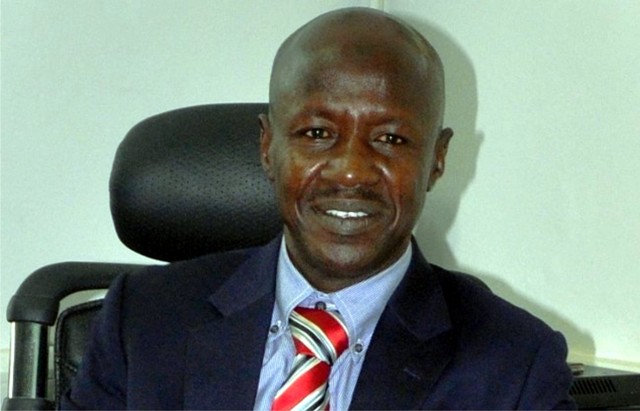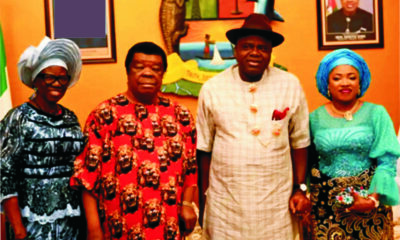Politics
Between Buhari’s Anti-Corruption Fight And The Polity

On assumption of office as President on May 29, 2015, Muhammadu Buhari had three cardinal focuses as far as his government was concerned: to curb insecurity, improve the economy, and fight corruption to a standstill.
Buhari’s emergence as Head of State and Commander of the Armed Forces of the country was thus viewed as a referendum of sort on the blight of institutionalised corruption, and the state of the country’s security.
In simpler terms, going by the highly proclaimed integrity of the President, many Nigerians were optimistic that he would stem the tide of unemployment, effectively deal with corruption, and crush Boko Haram and the like, to make Nigeria one of the safest place in the world.
With thirty-one days to the expiration of his first four years term in office, and commencement of another four year term, opinions are highly divergent in the extent to which the President, and the ruling party, the All Progressives Congress (APC), have fared in these key areas.
Although politicians expectedly support the stand of their party, even in sometimes ridiculously questionable circumstances, last Monday’s declaration by the Minister of Information and Culture, Lai Mohammed, that the government has a clean bill of health in all three spheres of focus, with particular emphasis on the fight against corruption, has brought the government’s performance in the period under review to more scrutiny.
The Minister, who spoke in a live TVC News Programme, stated that it will be unfair for Nigerians to measure the government’s achievements in the fight against corruption by the number of convictions it has secured.
According to him, the government has succeeded in laying enduring foundation for the fight against corruption through sustainable policies including institution of the Treasury Single Account (TSA), which ensures that all government money is paid into one account, and the Whistle Blower Policy.
“For us, success of the fight against corruption is the fact that we have driven corruption under the table and made it unattractive as it was before. Those who are corrupt are doing so with the fear of the law. It will progressively become more and more difficult in Nigeria for corruption to be attractive,” he said.
Analysts are of the belief that as much as the APC could be given some credit in its fight against corruption, the manner in which the fight is carried out has exposed all efforts put in it to question as to its real intention.
One of the earliest criticisms came in October 2015; just months after the government came into power. In a report by Sahara Reporters titled “Heavy Knocks for Buhari’s Anti-Corruption”, the Executive Chairman of the Coalition Against Corrupt Leaders, Debo Adeniran, claimed that he had severally petitioned the President and the anti-graft agencies, the Economic and Financial Crimes Commission ‘(EFCC) and Independent Corrupt Practices Commission(ICPC) over corruption and misappropriation of fund against Babatunde Fashola, a former Governor of Lagos State and the incumbent Minister for Power, Works and Housing in the Cabinet of President Buhari.
He also stated that several allegations of corruption and misappropriation of fund were slammed on Kayode Fayemi, the former Governor of Ekiti State; Kemi Adeosun, the estranged Minister of Finance, who was given the leeway out of retiring honourably after being found to be involved in National Youth Service Corp (NYSC) certificate forgery; and Rotimi Amaechi, a former Governor of Rivers State and current Minister of Transport.
Expressing concern over why these people were not invited by the anti-graft agencies for questioning, Adeniran said, “We are dissatisfied with the way the anti-corruption war is being fought and we are afraid that we may not achieve anything better than what we had before Buhari assumed office.
Mudiaga Affe summarised this in the Punch of April 22, 2019 when he said: “While the fight against corruption may have made some level of progress, the ruling party might have got itself involved in the whole twist by allegedly shielding some of its members fingered as suspects by the anti-graft agencies and welcomed other suspects to its fold”.
The government’s scorecard in security is also not encouraging. Stopping Boko Haram in three months, which was the promise of the Buhari-led government when it campaigned ahead of the 2015 election, has turned out to be a bed of explanations for failures, promises and assurances to do better, and more failures and promises.
The poor security situation cuts across the country: kidnappings, robberies, and killings associated to rituals are all on the high in all parts of the country. Rather than tackle the spate of insecurity in the land, like every other sensitive issue, it is politicised.
As the Nigerian government continues to search for a lasting solution to the Boko Haram insurgency, and other related security issues in the country, perhaps it is time to take the warning of retired Brigadier General Saleh Bala serious.
Bala once warned that playing politics with the Boko Haram insurgency would create a festering wound that could consume all facets of Nigeria’s resources.
“This is what is happening now. I strongly believe that we should have a national counter-insurgency strategy hinged on economic development, and the military strategy can pick up from there”’, he said.
Buhari and the APC did not fare any better in revamping the economy in their first tenure. An expert, and Chair of the Economics Department, Allegheny Collage, Professor Stephen Onyeiwu described Buhari’s economic scorecard thus:
“When he came to power in 2015, Buhari promised to tackle three interrelated problems: corruption, insecurity and the economy. Of the three, Nigerians regarded economic problems as paramount. But the administration appears to have focused on corruption and security issues and paid less attention to the economy.
“For example, Buhari failed to prevent an impending recession that followed the collapse of oil prices in 2015. This was because he didn’t prioritize the economy and took too long to articulate an economic transformation strategy.
“Another example of lack of focus on the economy was his meeting with US President Donald Trump in April 2018. Buhari asked for fighter jets, not economic support.
“Critics also point to the fact that Buhari ceded the management of the economy to his Vice President, Yemi Osinbajo. Though a brilliant lawyer, Osinbajo had no background or experience in economics. To make matters worse, Osinbajo surrounded himself with incompetent and inexperienced advisers.
“Buhari claimed he was unable to jump-start the economy because of falling oil prices and dwindling government revenue. Before he came to power the oil price was as high as $108 per barrel. It plummeted precipitously to $63 the month he was sworn in as president. The oil price continued to slide during the early stages of his administration, reaching an all-time low of $35 per barrel in February 2016.
“The collapse affected Buhari’s ability to put together a coherent budget. For instance, his 2016 budget had a deficit of over 2.2 trillion Naira. His attempt to borrow $30 billion to finance the deficit was vehemently opposed by the country’s lawmakers. Nor was public opinion favourable about an external loan. This forced the administration to pare down the number of projects it intended to undertake.
“Because of the administration’s inability to implement an expansionary fiscal policy, the economy has been grappling with anaemic growth since Buhari’s election. The country went into recession in 2016 followed by a rebound to about 2% in 2018. But the IMF projects that growth will remain weak at an annual average of about 1.9% from 2019 to 2023”.
What this means to the common man in the simplest of terms is that he found it more difficult to take care of his survival needs in the last four years than it had ever been in Nigeria.
But, like Professor Oyeiwu said, there is still room for improvement, if the “Next Level”” will address key economic issues. These, according to Oyeiwu, would require the President to evolve what he called a massive economic stimulus programme.
“If he can summon the energy, Buhari should significantly increase spending in sectors, projects and programmes that boost the economy generate employment and promote inclusive growth. He should prioritise infrastructure, labour-intensive manufacturing such as textiles and footwear, agro-processing, youth entrepreneurship projects, health and education.
“Nigeria has a very large stock of human and natural resources that are not being used optimally. Meanwhile, there is a huge infrastructural deficit. These range from dilapidated roads, epileptic electricity supply, acute water shortages, crumbling public buildings, grossly underfunded public tertiary institutions and so on. The gap can be closed through public works projects executed with direct labour”, Oyeiwu concluded.
Soibi Max-Alalibo
Politics
How We Saved N2.3bn From LG Reforms – Diri
Bayelsa State Governor, Senator Douye Diri, has revealed that the reforms initiated and implemented by his administration led to the saving of the sum of N2.3 billion for the local government councils.
The governor disclosed this recently at the opening ceremony of an orientation programme organised for newly-elected local government council chairmen, vice chairmen, councilors and principal officers at Perdis Hotel, Akenfa.
Gov Diri stated that on assumption of office in 2020, some local government councils were highly indebted and unable to pay salaries but his administration took measures that resulted in regular payment of salaries, execution of projects and saving of funds.
The Bayelsa State Chief Executive restated his call on the Federal Government to create additional local councils in the state, saying it was injustice for some states to have more than 40 councils and receiving monthly allocation from the Federation Accounts Allocation Commission (FAAC), while the state had only eight.
He charged the newly elected local government officials to make good use of the two-day workshop to equip themselves with the requisite knowledge to carry out their responsibilities.
The governor also called on them to work as a team to ensure that development was felt at the grassroots.
“Local governments as at 2020 were unable to pay salaries, particularly Nembe, Ogbia, Ekeremor and Sagbama. There was some form of dissatisfaction in the system.
“After I went through the recommendations of the Deputy Governor, whom I entrusted with investigating the local government, I wasted no time in approving the recommendations.
“The recommendations included the ban on loans from any source by local government chairmen without approval of the governor; compulsory savings by every council; and the division of balance after payment of salaries into 60 and 40 per cent respectively. One part was for compulsory savings and the other to project implementation and immediate commencement of computerisation of their payroll as well as compulsory quarterly award of projects by each council chairman.
“We found a lot of fraud in the local government system. But as it stands today, our councils have N2.3billion as a result of the combination of the factors of reforms and proper supervision of that tier of government.
“The breakdown is N400million compulsory savings while N1.9 billion for capital projects. This is aside from the one done by caretaker committees in terms of project execution within the short period they stayed”, the governor said.
Gov Diri assured of his administration’s commitment to support the councils to achieve their goals and expressed confidence that the new officials would meet the expectations of the people.
“We firmly believe that good governance begins at the grassroots level. That is precisely why we have gathered here to equip you with the necessary skills and knowledge to improve our local government administration and enhance service delivery.
Ariwera Ibibo-Howells, Yenagoa
Politics
Monarch Cautions Against Divisive Politics, Declares Support For Fubara
The Eze Oruamara/Regent of Okwuzi Kingdom in Ogba/ Egbema/Ndoni Local Government Area of the State, Eze Victor Afaka, has sued for peace among the political class in the State.
Eze Afaka made the appeal while speaking with The Tide on the sidelines of the governorship victory thanksgiving service by the Ogba Egbema /Ndoni Chapter of the Simplified Movement in Omoku.
He said Governor Fubara should be allowed to display the vision that God has given to him to govern the state.
According to him, since every administration has its term and tenure, the man presently at the helm of affairs in Rivers State must be given the opportunity to complete his own term and tenure.
“I advise politicians to sheathe their sword and allow peace to reign. Politics and governance have their terms and tenure. When it is your tenure, you have your vision to display; when you conclude that vision God has given you as a leader of your community or of a state, you step aside and leave the next person to display the vision God has given to him” he said.
The traditional ruler said he and his people, including the youth, women and the Ogbakor Egbema, decided to attend the service because of the excellent vision of Governor Fubara
“We are happy, Okwuzi people are in full support of the government, the government of His Excellency, Sir Siminalayi Fubara”, he added.
He said that the governor’s peaceful disposition to governance has endeared him to His Kingdom, noting that Okwuzi kingdom was already a beneficiary of the present administration’s purposeful governance as the Omoku/Okwuzi road abandoned 10 years ago, was nearing completion.
“ONELGA, Okwuzi are benefitting from his government.The road that was abandoned for ten years is being completed right now and we know that there are so many other things he will do for us”, he said.
While urging the state government to give desired attention to the Okwuzi General Hospital that is in a state of dilapidation, Eze Afaka entreated Governor Fubara not to be distracted, but to continue to promote peace and development across the State.
John Bibor
Politics
APC Stakeholders Storm Secretariat, Demand Ganduje’s Resignation
A group of North Central stakeholders in the All Progressives Congress (APC) has stormed the national secretariat of the party in Abuja, demanding the resignation of the National Chairman, Dr Abdullahi Ganduje.
Addressing newsmen in Abuja yesterday, the protesters said their demand followed his recent suspension by a faction of his ward executives and the alleged bribery allegation levelled against him by the Kano State government.
While they chanted solidarity songs and displayed several banners some of which read, “Ganduje must resign” and “Return the APC chairmanship to North Central,” the protesters appealed to President Bola Tinubu and the Secretary to the Government of the Federation (SGF), George Akume, to consider returning the leadership of the party to the North Central.
Only on Tuesday, the Forum of APC State Chairmen had passed a vote of confidence on Ganduje, affirming their unalloyed support to him.
The protesters under the aegis of Concerned North Central APC Stakeholders lamented that the continued stay of Ganduje in office was a clear violation of the zoning principle in the party.
Mohammed Saba, who led the protesters, said unlike the 37 APC state chairmen, his people in the North Central have passed a vote of no confidence on the national chairman and equally demanded his immediate resignation.
Saba reiterated that the people of North Central felt betrayed when the position of APC national chairman was hijacked from them following the exit of Senator Abdullahi Adamu despite giving Tinubu the third highest votes after North West and South West at the 2023 presidential election.
He said, “We, the North Central APC Concerned Stakeholders, have resolved to unanimously agitate for our right and reclaim our mandate which was handed unto us by the National Convention of our great Party in 2022.
“Various sections of our constitution have established the procedure of replacing an executive member at all levels of the party in the event of death, resignation, incapacitation or expulsion from the party by any executive member.
“It is a fact that the emergence of Dr. Umar Ganduje as national chairman was done against the spirit and soul of the APC which is the constitution of our great party. This singular act has impacted negatively on us as a people in the North Central.
-
Sports1 day ago
Eaglets Held In Pre-WAFU Friendly
-

 Rivers5 days ago
Rivers5 days agoBayelsa LG Polls: BYSIEC Issues Return Certificates To Chairmen, Others
-
Politics1 day ago
Fubara’ll Leave Rivers Better Than Expected – LG Boss
-

 News5 days ago
News5 days agoJAMB Sanctions Officials For Asking Candidate To Remove Hijab
-

 News1 day ago
News1 day agoRHI: Lady Fubara Donates 50,000 Books To Public Schools In Rivers
-
Women1 day ago
The Wise Woman
-
News5 days ago
Waive Tax On Electronic Imports, Women Engineers Appeal To Tinubu
-
Niger Delta1 day ago
Steer Clear Of NNS Delta, Commander Warns Criminals

